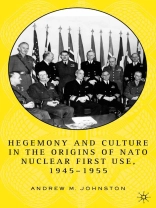Johnston argues that the preemptive first-use of nuclear weapons, long the foundation of American nuclear strategy, was not the carefully reasoned response to a growing Soviet conventional threat. Instead, it was part of a process of cultural ‘socialization’, by which the United States reconstituted the previously nationalist strategic cultures of the European allies into a seamless western community directed by Washington. Building a bridge between theory and practice, this book examines the usefulness of cultural theory in international history.
Table des matières
The Persistence of Nuclear First-Use in History and Theory Culture, Strategy, and Empire The Persistence of the Old Regime: British, French and American Strategic Culture before 1949 Disembodied Military Planning: The Political-Economy of Conventional Strategy, 1949-1950 Mind the Gap: The Myth of the Lisbon Force Goals, 1951-1952 Two and a Half Strategies of Peripheralism: France, Britain and the Eisenhower Administration Two Cultures of Massive Retaliation: Neo-Isolationism and the Idealism of John Foster Dulles Hegemony Versus Multilateralism: Nuclear Sharing and the Search for Cohesion in the New Look Our Plans May Not be Purely Defensive: Leading NATO into the Nuclear Era Conclusion: What Does Culture Tell Us About Nuclear Strategy That We Were Afraid To Ask?
A propos de l’auteur
ANDREW JOHNSTON is Assistant Professor of History at the University of Western Ontario, Canada and Co-director of its Centre for American Studies.












